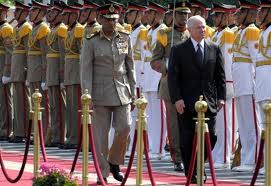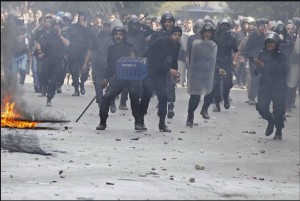I have been obliged on a few occasions to explain why I quote from previous commentaries so often.
In a nutshell it’s because I find nothing more disingenuous and self-serving than commentators waxing clairvoyant on unfolding events by claiming they predicted things would be thus in one or another commentary, but conveniently failing to provide a link to that commentary. They do this of course because they know virtually nobody in our “twitterverse” will be bothered to call them on it.
 Such is the case with the events now unfolding in Egypt’s Tahrir Square. Specifically, some high-profile commentators are doing all they can to spin their hind-sighted genius into prescience by claiming they warned that the Egyptian military would turn out to be a bigger devil than the Mubarak regime it helped pro-democracy protesters overthrow.
Such is the case with the events now unfolding in Egypt’s Tahrir Square. Specifically, some high-profile commentators are doing all they can to spin their hind-sighted genius into prescience by claiming they warned that the Egyptian military would turn out to be a bigger devil than the Mubarak regime it helped pro-democracy protesters overthrow.
No doubt you recall during the early days of the Arab Spring that the military was being hailed around the world for its refusal to fire on the protesters, which many experts on Egyptian politics assert was the proximate cause of Mubarak’s demise.
But here is the cautionary note I sounded … back then:
With all due respect to the protesters, the issue is not whether Mubarak will go, for he will. (The man is 82 and already looks half dead for Christ’s sake!) Rather, the issue is who will replace him. And it appears they have not given any thought whatsoever to this very critical question.
The devil the Egyptians know might prove far preferable to the devil they don’t. Just ask the Iranians who got rid of the Mubarak-like Shah in 1979 only to end up with the Ayatollah – whose Islamic revolution they’ve regretted (and have longed to overturn) ever since….
(Army pledges no force against protesters, The iPINIONS Journal, February 1, 2011)
 More to the point, there was this:
More to the point, there was this:
I also find it curious that Obama is effectively calling on the Egyptian military to guarantee the protesters’ democratic aspirations. Ironically, he and other Western leaders seem to believe that the best way to transition from Mubarak’s dictatorship to democracy is by installing a de facto military dictatorship. The problem, however, is that in almost every case where this strategy has been deployed (e.g. in Pakistan and Burma) the military ends up overstaying its welcome … by years, if not decades.
(Crisis in Egypt: the end game, The iPINIONS Journal, February 4, 2011)
Therefore, I hope you’ll forgive me for claiming a little clairvoyance now that the prevailing view of what is going on in Egypt these days is as follows:
Egypt interim military rulers are increasingly repressing civil rights, sparking an outcry from Egyptians who say that the generals who promised to lead a transition to democracy have instead become even more restrictive than former President Hosni Mubarak.
(The Christian Science Monitor, September 13, 2011)
 In fact, the situation has deteriorated so much – with over 30 protesters reported killed in the past few days – that yesterday all members of the civilian Supreme Council the military installed to give its rule the veneer of democratic legitimacy resigned. Unfortunately, this will do even less to advance the cause of democracy than overthrowing Mubarak did.
In fact, the situation has deteriorated so much – with over 30 protesters reported killed in the past few days – that yesterday all members of the civilian Supreme Council the military installed to give its rule the veneer of democratic legitimacy resigned. Unfortunately, this will do even less to advance the cause of democracy than overthrowing Mubarak did.
The ominous fact is that the military rulers have just cause to fear ending up like Mubarak: in prison awaiting trial on a battery of corruption and murder charges. After all, they too have amassed so much ill-gotten wealth and ordered so many killings that to subordinate themselves to civilian rulers would be tantamount to signing their own arrest warrants.
Military rulers will continue to pay lip service to democratic elections. But, just as it was during Mubarak’s reign, they will ensure that no civilian government has the authority (or would dare) to check their power or investigate their activities.
This is why I’m afraid the only way these protesters will get rid of the military leaders who have always ruled Egypt is if there’s a split in the military like the one now developing in the Syrian military. This of course would portend civil war.
I am reminded though that it took nothing less than a civil war for the paragon of democracy, the United States, to find its way. I just hope the folks in Tahrir Square are prepared to die by the thousands for their cause.
Finally, for the record, I think Egypt would be far better off today if protesters had accepted Mubarak’s offer to oversee preparations for free and fair elections within a year in which neither he nor his putative heir apparent would stand. Instead of pleading for the U.S., EU and Arab League to force his ouster, the protesters should have called on them to jointly guarantee Mubarak’s offer.
This would have given the thoroughly humbled Mubarak a way to bow out of public life gracefully and avoided the political, economic and social chaos and stagnation that have reigned since his ignominious ouster.
Alas, the protesters were (and remain) too intoxicated with their new-found power and influence to even countenance this pragmatic transition. But they will learn soon enough that perpetual protest is no way to build a country….
Related commentaries:
Army pledges no force…
Crisis in Egypt…